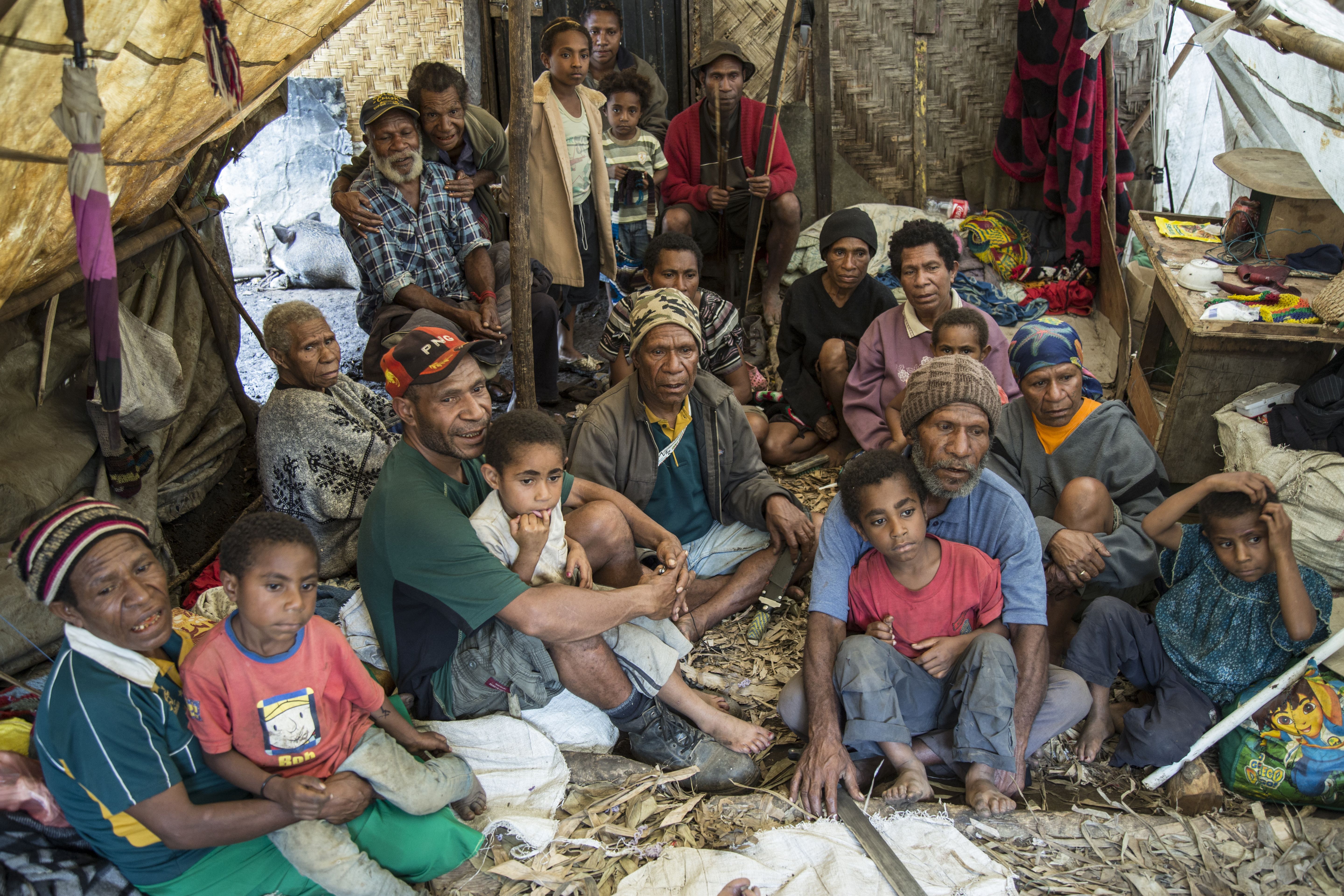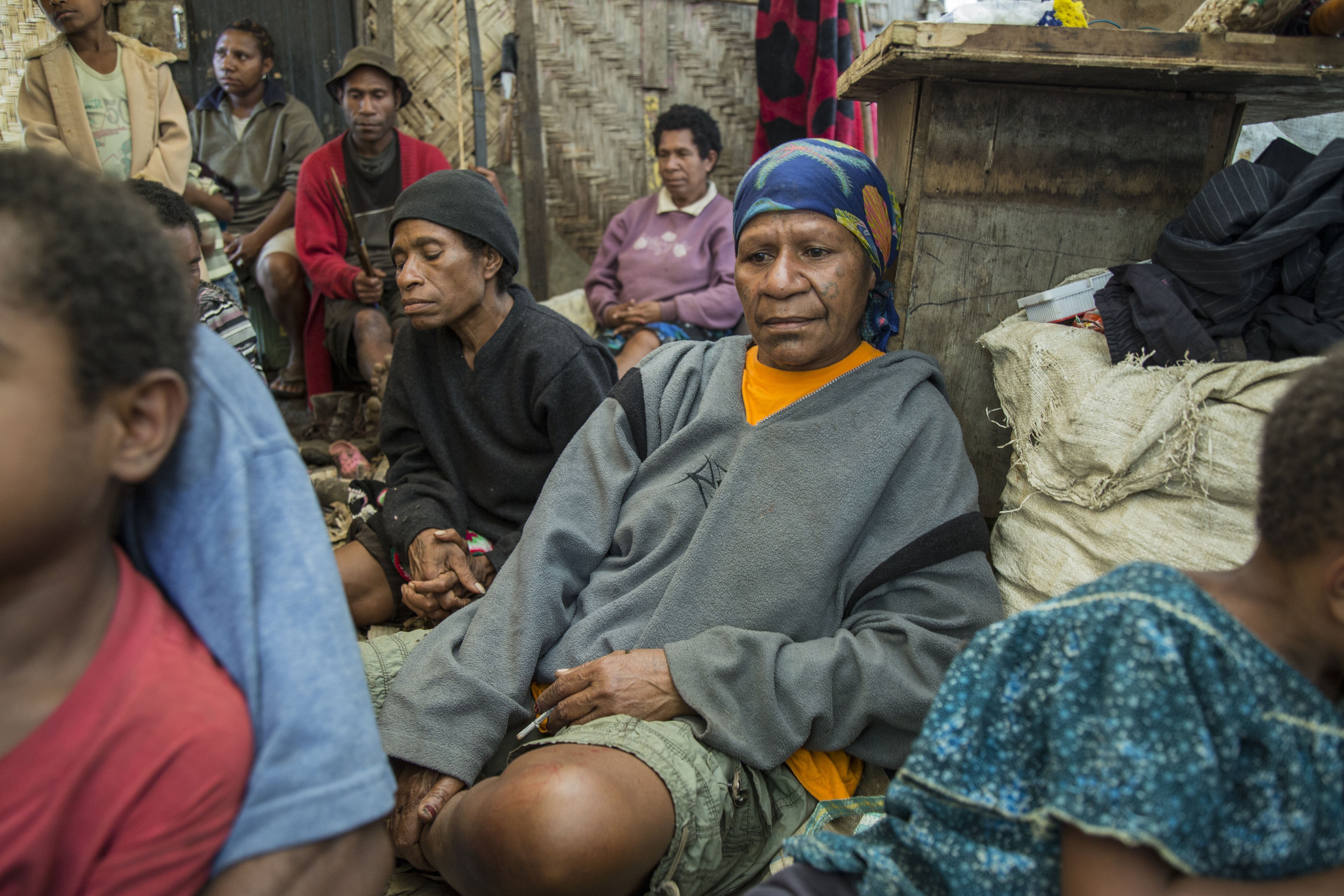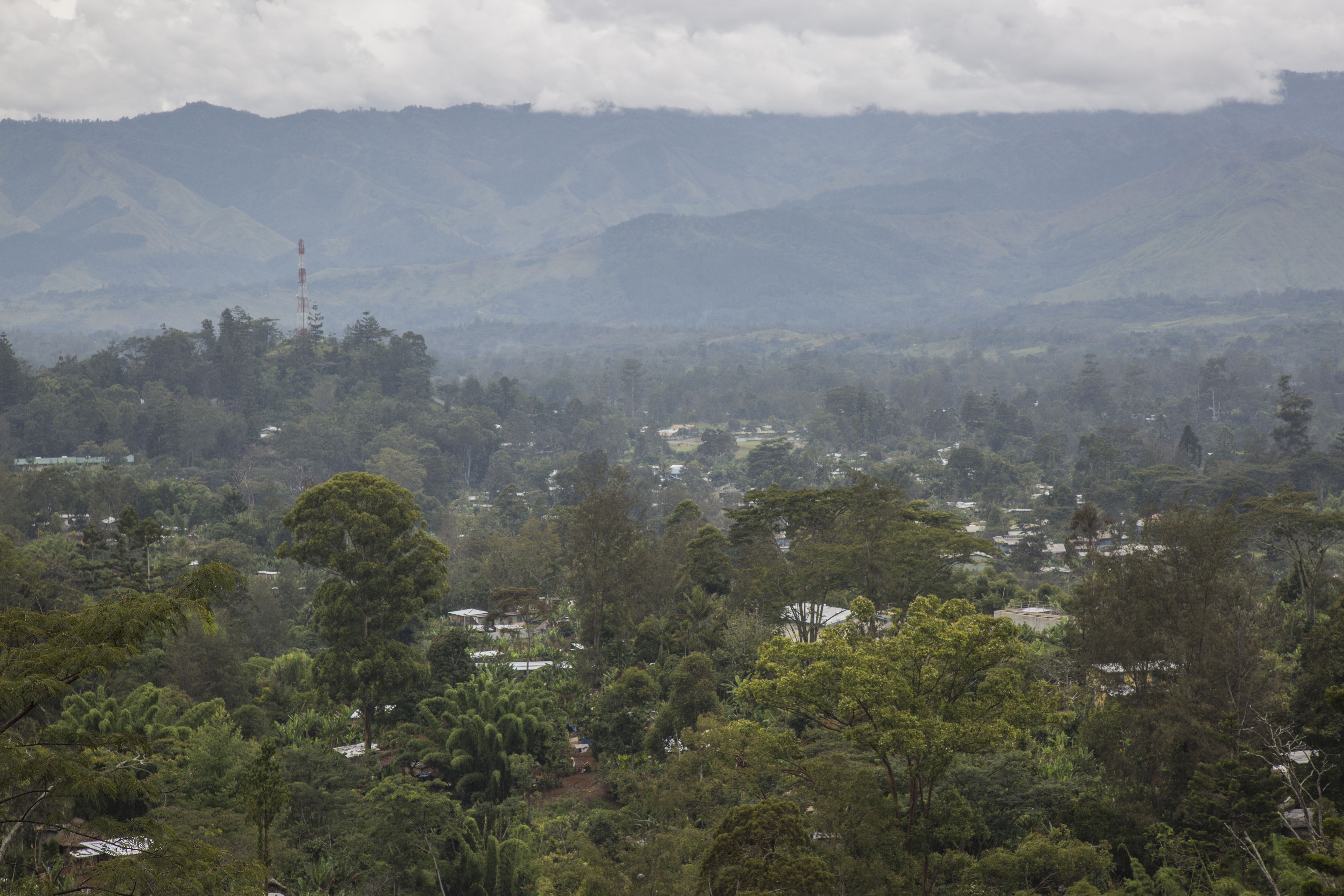GOROKA, Papua New Guinea — In late 2014, Midear Kuwi, a woman in her mid-50s, was taking a shower at her home in the village of Ouvakavi, in the highlands of Papua New Guinea, when a group of angry men encircled her house. They shouted that she was a witch and that she had caused an illness in the family of a powerful local official. Before long, she was their hostage.
“They took me to their house and interrogated me,” Kuwi said, quietly. “They asked me if I performed sorcery. I told them I didn’t know anything about it. So they became frustrated and took a piece of metal pipe and started beating me with it.”
The men hit Kuwi with the metal rod on her knee and hip, which was still sore to the touch, and then struck her on her head, she said. She pointed to a bald patch on her scalp where a scar was still forming.
Police never intervened, she said, and the beating stopped only when her male relatives, who outnumbered the attackers, stepped in and threatened to kill the entire family of accusers.
In the remote highlands of Papua New Guinea, there is a saying that no one dies a natural death.
The belief in sanguma, a catch-all local word that describes a method of causing harm to someone without laying hands on the person, has been around for centuries as a customary belief in this Pacific island nation, as it was until recently in Europe and North America. But in many areas of the country, accusations of using black magic are intensifying.
Hundreds of people have been accused of practicing black magic targeted by vigilantes in recent years, according to the United Nations
“Suspected witches have been thrown from cliffs, tortured, dragged behind cars, burned or buried alive,” stated a United Nations report from 2012.
Many of the victims are poor, vulnerable women like Kuwi, living in the remote and highland provinces.
“The rates of violence, not just sorcery but generalized sexual violence, are at epidemic levels,” said Philippe Allen, who until recently served as the country director at Oxfam, an international aid group. “These women are being born into war zones.”
Police and community activists are at odds as to why the attacks are increasing. But they may be driven in part by trends surrounding the country’s recent economic development.
Papua New Guinea is in the midst of a resource boom, including a $15.7 billion Exxon Mobil gas export project, and the spike in foreign investment has brought the country into middle-income status. GDP quadrupled in the past 10 years, and the country is forecast to have fastest-growing economy in the world in 2015, according to the International Monetary Fund.
But not everyone is benefiting. Many of the gains of recent economic development fail to reach rural areas, where more than 85 percent of the population lives. Nearly 40 percent of the country remains under the poverty line, defined as living on less than $1.25 a day at 2005 prices.
This growing wealth gap is leading to wealth disputes at the bottom, according to Kamane Waugo, a program officer at Oxfam who works with sorcery accusation victims across the highland provinces.
“We are so isolated in our villages. It’s just me relating with the same community members all my life, so the relationship is very intense, and there’s a lot of frictions,” said Waugo. The attitude of the villagers is, “If anything doesn’t go well with me, I’ll take my frustration out on the community members.”
“Sorcery is a good excuse used to take people out,” he added.
Oxfam estimates that at least 50 percent of the sorcery-related violence in the country is related to wealth disputes. “One tribe may have coveted another tribe’s land for some time, and a very easy way of getting people off their land is to accuse them of being witches or sorcerers,” said Allen.
The organization is evacuating, on average, 15 people per week who have been accused of sorcery. Intervening within the first 48 hours after an accusation is made can be a matter of life or death. It pays for helicopters, buses or vehicles under police convoy to help victims escape to safety in regional capitals.
The assaults are often sudden and brutal. Anyone accused of black magic may have only hours to escape before the situation turns deadly — as it nearly did in November in Yabiyufa village, just 30 miles from Goroka, the capital of Eastern Highlands province.
When an elderly man died in Yabiyufa, his son claimed that two of his neighbors — who owned land that next to his small farm — used black magic to kill his father, according to the Kafe Women’s Association, a local civil society organization that supports people who were accused of sorcery and is partially funded by Oxfam.
By the time the sun set two days later, mobs of angry villagers had burned down the men’s houses and chased their families from the village.
“They were both accused of sorcery, but because of that, the entire family — their wives, their children — we are all affected,” said Anita John, the wife of one of the accused.
Now 35 members of the extended family have taken refuge in Goroka in a muddy, makeshift shelter that resembled a ramshackle hut from a refugee camp.
Without speaking the local Goroka dialect, the family didn’t feel safe, and they feared being accused again. “We can’t stay like this,” said John, with tears welling in her eyes. “Staying here is not safe.”
Villagers are quick to say, “Those are the troublemakers, the sorcerers. Don’t talk. Just kill them,” said Eriko Fufurefa, the director of the Kafe Women’s Association. “Everybody in the community supports this,” she added.
Until recently, the 1971 Sorcery Act, which activists say gave cover to perpetrators of attacks, backed witch hunters.
“Sorcerers have extraordinary powers that can be used sometimes for good purposes but more often for bad ones … Many evil things can be done, and many people are frightened or do things that otherwise they might not do,” read the preamble of the law.
A slew of gruesome killings drew international attention to sorcery slayings and led to an effort to implement a new set of laws aimed at stemming the violence.
In 2012 police arrested 29 members of a witch-hunting gang they said cannibalized people they suspected of being witches. A year later, a woman in nearby Mount Hagen was reportedly burned alive after being accused of practicing black magic. Cellphone images show onlookers watching her in flames and pleading for help on a heap of burning trash.
The next year the government repealed the Sorcery Act and reinstated the death penalty, which officials hoped would provide a deterrent to would-be attackers.
Despite the new laws, police say they are often powerless to act because the belief in witchcraft is so widespread.
Investigations into the violence often lead nowhere, said Judy Sirowa, a sergeant in charge of the family and sexual violence program at the Goroka Police Department, because villagers are reluctant to give police any helpful information and fear they will be accused themselves or will become the victim of a sorcerer.
“We go out, we have a report, but we get nothing from people out there,” said Sirowa.
Attacks also happen in remote areas, far from law enforcement, and with limited federal funding for protection, the police’s ability to reach many villages has never been more limited, she said.
“When we ask, they say, ‘No money, no money,’” she added.



![Rose Oye, approximately 45 years old, from Loki, in the Eastern Highlands Province. "When I was accused [of sorcery], I was scared," she said. "I thought that at any point I could be killed." The local advocacy group KAFE helped her family flee, and resettled her in a new home (pictured behind her) in Goroka, the regional capital. Image by Benedict Moran. Papua New Guinea, 2015.](https://legacy.pulitzercenter.org/sites/default/files/styles/node_images_768x510/public/06-06-15/6l8a2389_sm.jpg?itok=XJLT_04d)







